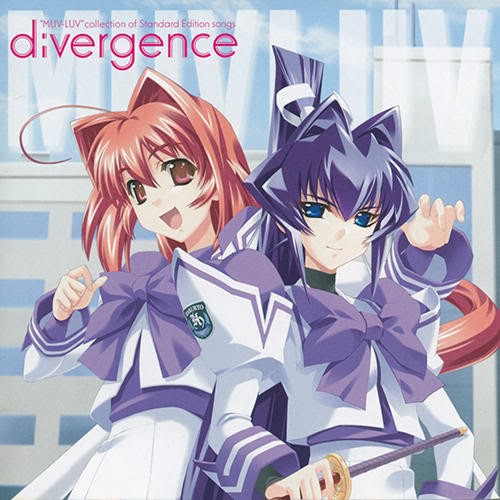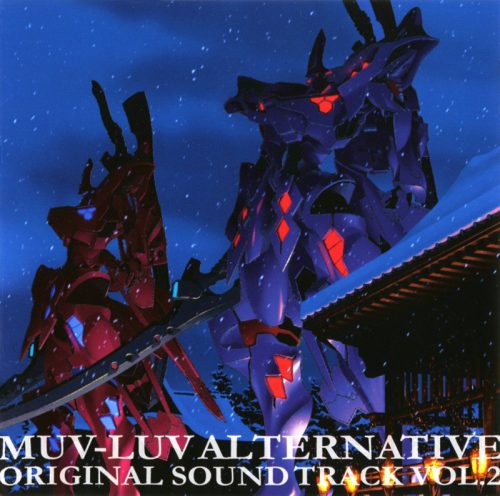

Muv-Luv: Alternative is a tragic story, its exterior hardened by the reality of war. Past its outward appearance, at the core of its soul, is a story that desperately wants you to remember your humanity. It builds a strong empathy for its characters, making its tagline unforgettable, “Save in the name of true love.” The previous article reminded viewers of plot details while transitioning into historical parallels. As such, it’s important to read the previous article before this one. This article will talk more about how Muv-Luv focuses more on character portrayals and how their depictions are influenced by historical concerns. By doing this, I hope to finally move towards broader themes in the next article and the intertextual nature of its story.
Noble and Human, Meiya: Ideals of Self-Sacrifice
To the people of Japan, members of royalty are literal gods, ruling by divine decree. The Shogun is Meiya’s twin sister, Yuuhi. Until this point, Meiya’s background in Alternative had some mysteries. In Extra, she was archetypal: an absurdly rich girl with little life experience. In Alternative, her personality is similar but gone is her naiveté. As a soldier, she is a sage; her advice gives Takeru a necessary check and new perspective. What causes this difference? The writers give insight. During the ceasefire, Meiya’s role is defined further. We learn that, within some Japanese clans, twins are a bad omen. If the general public knew about Meiya, there might be a loss of faith. Thus Meiya is separated from her sister. It’s from here that two things get established. First, Meiya is meant to mirror Yuuhi. Meiya undergoes the same teachings as Yuuhi, so if the Shogun’s life is in danger, Meiya can be sacrificed to save her sister. That time is fast approaching. Second, due to her “purpose,” Meiya embodies the idea of self-sacrifice. It is this ideal that drives her decisions. Her belief in the UN, her shouldering of responsibility and love for her country, even her deprecating view of her own life--all of this stems from her core belief in self-sacrifice. This creates a strange duality with Meiya. On one side, she is revered as a god by Japanese civilians, the Mount Tengen incident in Unlimited is an example. On the other side, she is fully human, encompassing the values of self-sacrifice, the very core of the UN military. This is her split--her feelings of duty (role as a sacrifice and soldier) and personal feelings (love of her country and people). It is with this context, the writers move onto the next stage. As part of a two-fold plan, Meiya offers to go in Yuuhi’s place to negotiate with the rebels. According to Meiya, “it is my duty by birth to serve as Your Highness’s living duplicate… This may be the only opportunity for my life to be of use to you.” If negotiations fail, Meiya will act as bait so the Shogun can escape the rebels.
Parallels of History and Character: Meiya’s “Declaration of Humanity”
During the ceasefire, negotiations between Sagiri and Meiya begin with formalities. Afterward, the “Shogun” addresses Sagiri, and she states: “I truly regret having forced you all into such a position through my own incompetence… As you said in your broadcast, the current state of our Imperial Diet and the military is far from ideal… A stark contrast exists between my will and their actions… It is simply that all too often, the sheer intensity of their emotions will inevitably give rise to misunderstandings and conflicts. And it is my inability to properly resolve these conflicts that is to blame for this.” Placing herself forward, the “Shogun” claims she is the one to blame. She even defends the government--their “flaw” is their intensity. In this scene, the writers want to combat an idea, “those in positions of power do not care for those below.” This division between the average citizen and those in power can create animosity and distance. After all, it’s what started the war. Sagiri interrupts: “Pardon my impertinence, Your Highness… But as you say, the government is taking political actions in your name with no respect for your actual wishes. And this is exactly why I cannot remain silent… When conflicts arise, it should not be Your Highness’s duty to restore order; by rights, the government and military should govern themselves. But unfortunately, it seems they no longer see fit to hold themselves accountable.” Sagiri responds with logic. He rationalizes the mindset of the rebels: the corrupt government abuses their power, pushing down the citizens and demeaning the Shogun’s position. In effect, they are committing sacrilege--they are the ones to be blamed. This exchange mirrors concerns from our history. After WWII, the occupation of Japan was headed by General Douglas MacArthur. At that time some of Japan’s concerns were: a lack of resources (a starving population), the growing occupation of US forces, and the issue of the war’s blame. These problems are evident concerns of the rebel forces with the last is being emphasized by Sagiri. He states, “If I may be so bold, I would say that they [the government officials] are the true traitors here. They are utterly unworthy of Your Highness’s compassion!” Who is going to take the blame for this war? Who is going to take the fall so that the deaths can be justified--so their death has some meaning? Sagiri then explains that “this entire debacle was, in truth, a plot drawn up by the Americans to fulfill their own hidden agenda… I am still the one who allowed this to happen… and I know full well that that is a sin for which I can never atone.” At this, Meiya begins to cry. Her sadness that her words cannot convince Sagiri, that her belief in her country has lead to division and cruelty, that her fellow man has taken another’s life for political gain--that this war has revealed that humans are separated from humanity--has crushed her. In these moments, she is not a “god” but a human. She feels the bloodshed not from above or afar but close enough to her heart. For a moment, Takeru is frightened that her cover is blown, but in an act of resilience, Meiya reveals her earnest feelings, “If you feel so strongly… for your country, and its people… and for myself, as your shogun… then why have you struck down your fellow man!?” Not fellow Japanese, not fellow soldier; fellow man. With those words, the scene transitions into an emotionally-charged song. Lead by the violins, Meiya speaks from her heart, “Blood only begets more blood, and violence more violence. Think about the actions you took that brought about this sordid affair… Can you truly claim they were out of consideration for myself and the people? Meiya echoes the same sentiments as her sister, the parallels of her emotions show how much she’s thought about her sister’s responsibility. Meiya, and by logical mirroring, Yuuhi, cares about the people: “Our country… This nation we call Japan… exists first and foremost within the hearts of its people… And the Shogun is but a mirror… meant to reflect that concept of our nation which lives within their hearts. This is what I believe… And of what use is a mirror… if it has nothing to reflect…?” Meiya’s statement argues against governing by divine decree, that a country is its ruler. It’s through this context that we understand the Shogun is human, an idea borrowed from our history: the 1946 “Humanity Declaration” by Emperor Hirohito. To connect humanity to one another, Meiya must “step down” from her role as Shogun. She must define herself by her flaws, her emotions, and her empathy. She must show she is like her people, a human being. This next sequence is a direct critique, “To protect Japan is to protect its people… for a country is nothing without its people. You understand that more than anyone… and yet, you have strayed from the righteous path…” Sagiri is left speechless, Meiya’s words introspective of his actions. Sagiri is a man jaded by the Japanese government. The UN/US decision to G-bomb Yokohama, an event that mirrors the atomic bombing of Japan, radicalized Saigiri, furthering his hatred of the Japanese government and foreign forces. If he truly believed he cared about the people, then he must answer Meiya, “Why have you struck down your fellow man!?”
Defined by Humanity: From the Ashes, a New Japan
At the end of the war, Yuuhi gives a speech. If there were doubts about whether Meiya parallels her sister, they end here. In a speech honoring the lives lost, Yuuhi says, “My beloved countrymen. You have my sincerest apologies for the long and arduous trials you have been forced to endure this day. This incident, this rebellion, was staged by brave youths in an attempt to liberate our nation from the errors of the state--a corollary of my own incompetence.” First, she begins with an address to her audience, “beloved countrymen.” This reveals her perspective/feelings of her listeners while condensing the demographic. She contextualizes this event for her audience not as a civil war but as an “incident...an attempt to liberate our nation.” She takes the blame for the event, its cause, her flawed leadership. She continues: “And to be certain, their deeds should in no way be considered permissible… But nonetheless, I find myself unable to condemn them for their desire to see a reawakening of Japan, nor will I vilify the convictions which compelled them to stand up and fight.” As stated through the 12/5 incident, the expected outcome of the rebels was their death. Even if they were recognized by the Shogun, due to their uprising, the rebels themselves anticipated death as their punishment, a price they’d pay to change Japan. However, Yuuhi shifts the outcome. Just as Meiya was distraught over the bloodshed, so is Yuuhi. Instead of calling for more blood, she condemns their deeds but not their convictions. The idea of “reawakening of Japan” is not innately wrong. It is the actions they took that set them on the wrong path. Yuuhi clarifies: “I realize now that the true takeaway from this situation is that we could all strive to better reflect those oft-forgotten values that uniquely define us as Japanese. And in so doing, I believe we will find the strength we need to come together as a species and stand up to our formidable adversary.” She gives value to the cause where many died. In doing so, she wants to start defining a new interpretation of the incident. If she left this incident undefined, it would carry on animosity for decades, closing any hope of truly uniting. She affirms that importance of a nation’s identity, “values that uniquely define… Japanese” while stating the importance of coming together. The views of the previous era and new era global get interwoven. It is not the extremes of both sides but the mixing of both that will allow humanity to stand up against a common enemy. Continuing on, Yuuhi implores her audience: “So let us take their noble intent as an example, and unite ourselves in conquering this adversity, that we might one day be victorious and restore peace to the world… I shall press onward, bearing the weight of their dying wishes upon my shoulders… Let us not fall victim to the same mistakes, but instead aspire to bring out the best in one another, as we walk hand in hand toward a brighter future.” Yuuhi places a weight upon her shoulders. This weight is not a burden but a responsibility, a reminder that clears her mind and defines a path forward. Whereas before she was lost in how to lead her country, there is now a specific goal to obtain: peace. In order to honor the fallen victims, to not repeat history, Yuuhi wants to lead by example. She wants to inspire a nation that is united by humanity for humanity. She wants to head to a future while recognizing the past. It is from this moment that Japan is given a new direction. One molded by sacrifice, defined by a goal, and inspired by a love of humanity. Alternative becomes defined by a new mindset: patriotism.
Final Thoughts

The 12/5 Incident is a major event within Muv-Luv: Alternative. It starts multiple character arcs while transitioning the story into new themes. By recontextualizing the past and our history, the Muv-Luv authors define a new direction for the story. In the next article, we will discuss broader themes in Alternative while showing how its story is framed through a lens of patriotism.
[recommendedPost post_id='256154' url='' title='' img='' class='' widget_title=''] [recommendedPost post_id='256162' url='' title='' img='' class='' widget_title=''] [recommendedPost post_id='261672' url='' title='' img='' class='' widget_title=''] [recommendedPost post_id='262506' url='' title='' img='' class='' widget_title='']
Add Comments